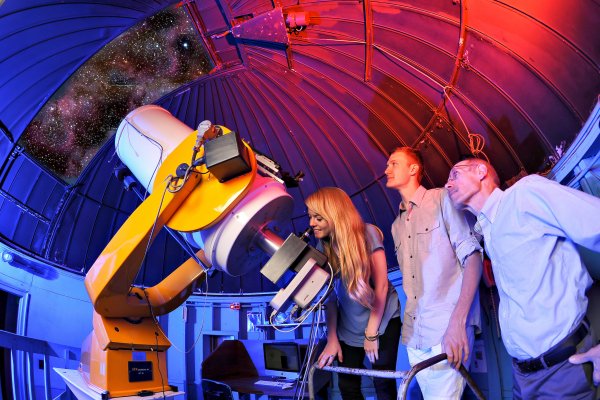Career Paths
How will you use your analytical skills?
A major in physics opens up a wealth of employment opportunities in all sectors of the economy.
Nationally, 95 percent of graduating physics students reported they were employed or obtaining further education six months after graduating.
The physics major at Valpo provides graduates with desirable skills:
- problem solving
- quantitative and data analysis skills
- technical communications
- scientific literacy and integrity
- computer skills
- experimental design
- familiarity with electronic and scientific apparatus
- ability to work independently and with groups
- presentation experience
- interdisciplinary experience
These skills help to explain why physics majors, on average, do exceptionally well on the entrance exams to law and medical schools — better than graduates from almost any other major.
Because of this strong skill-set, physicists have a broad range of career opportunities. Often, physicists who go into areas other than physics or astronomy end up in leadership roles in engineering and other technical firms.
Physics graduates bring their exceptional abilities in problem solving into the field of their choice. Opportunities range from research positions in industry to medicine, education, law, or engineering.
The Role of Physics Majors
Overall, about three-fourths of physics graduates take jobs within natural sciences, technology, engineering, and math (STEM) fields. Most physics graduates who go into non-STEM fields find employment in the private sector.
Within the private sector, physic majors enter the following fields:
- Non-STEM (26%)
- Physics or astronomy (5%)
- Engineering (32%)
- Computer or information systems (21%)
- Other STEM (16%)
Hiring Institutions
The most current data from the American Institute of Physics show that students who graduate with a physics major work in all sectors of the economy:
- Private sector (53%)
- College and university (13%)
- High schools (11%)
- Civilian government and national laboratories (10%)
- Active military (8%)
- Other (5%)
Physics majors may find jobs at institutions as diverse as observatories, nuclear plants, research laboratories, and high schools.
One jobs resource: Physics Today Jobs site, physicstoday.org/jobs
Graduate School
About half of Valpo alumni do graduate work in physics or astronomy, at institutions including MIT, Yale, Notre Dame, Vanderbilt, Kent State, University of Washington, and the University of Illinois at Urbana Champaign.
Nationally, most physics majors pursuing graduate studies choose to enter a physics Ph.D. program, where tuition is free and stipends average about $20,000 a year. A Ph.D. program typically takes five to six years: two years of classes and three to four years of research. About two-thirds of recent graduates go into some kind of academic position (post-doctoral research, permanent, or temporary), about 20 percent into government positions, and 15 percent into industry.
A master’s degree in physics typically takes two years. About 50 percent of M.S. students enter the workforce after graduation, while 30 percent go onto Ph.D. programs in physics and 15 percent pursue additional schooling in other areas.
The Professions
The fields of law and medicine rely heavily on the same analytical skills that physics majors develop. Physics majors:
- Outscore almost all other majors on the medical school admissions test (MCAT)
- Score the highest on the law school admission test (LSAT), out of every undergraduate major
Students interested in these fields should take advantage of Valpo’s resources in pre-medical arts and pre-law.
